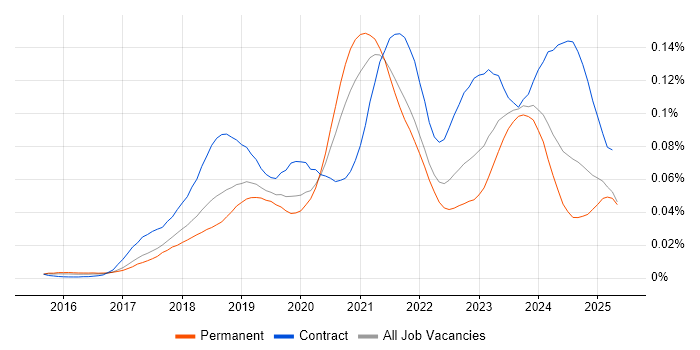Microsoft Azure App Service
UK > England
The table below provides summary statistics for permanent job vacancies advertised in England requiring Azure App Service skills. It includes a benchmarking guide to the annual salaries offered in vacancies that cited Azure App Service over the 6 months leading up to 2 June 2025, comparing them to the same period in the previous two years.
| 6 months to 2 Jun 2025 |
Same period 2024 | Same period 2023 | |
|---|---|---|---|
| Rank | 646 | 800 | 852 |
| Rank change year-on-year | +154 | +52 | +279 |
| Permanent jobs citing Azure App Service | 27 | 65 | 50 |
| As % of all permanent jobs advertised in England | 0.055% | 0.071% | 0.059% |
| As % of the Cloud Services category | 0.19% | 0.21% | 0.14% |
| Number of salaries quoted | 19 | 58 | 48 |
| 10th Percentile | £50,750 | - | £53,750 |
| 25th Percentile | £51,000 | £55,000 | £60,938 |
| Median annual salary (50th Percentile) | £65,000 | £66,000 | £77,500 |
| Median % change year-on-year | -1.52% | -14.84% | +19.23% |
| 75th Percentile | £73,125 | £73,438 | £95,938 |
| 90th Percentile | £87,500 | £120,000 | £130,000 |
| UK median annual salary | £65,000 | £65,000 | £75,000 |
| % change year-on-year | - | -13.33% | +15.38% |
All Cloud Skills
England
Azure App Service falls under the Cloud Services category. For comparison with the information above, the following table provides summary statistics for all permanent job vacancies requiring cloud computing skills in England.
| Permanent vacancies with a requirement for cloud computing skills | 14,021 | 31,006 | 36,587 |
| As % of all permanent jobs advertised in England | 28.42% | 34.08% | 43.48% |
| Number of salaries quoted | 9,408 | 24,433 | 24,710 |
| 10th Percentile | £31,250 | £30,000 | £34,452 |
| 25th Percentile | £42,500 | £41,250 | £46,250 |
| Median annual salary (50th Percentile) | £60,000 | £57,500 | £65,000 |
| Median % change year-on-year | +4.35% | -11.54% | +4.00% |
| 75th Percentile | £82,500 | £77,500 | £85,000 |
| 90th Percentile | £105,000 | £97,500 | £105,000 |
| UK median annual salary | £60,000 | £57,500 | £64,500 |
| % change year-on-year | +4.35% | -10.85% | +3.20% |
Azure App Service
Job Vacancy Trend in England
Job postings citing Azure App Service as a proportion of all IT jobs advertised in England.

Azure App Service
Salary Trend in England
3-month moving average salary quoted in jobs citing Azure App Service in England.
Azure App Service
Salary Histogram in England
Salary distribution for jobs citing Azure App Service in England over the 6 months to 2 June 2025.
Azure App Service
Job Locations in England
The table below looks at the demand and provides a guide to the median salaries quoted in IT jobs citing Azure App Service within the England region over the 6 months to 2 June 2025. The 'Rank Change' column provides an indication of the change in demand within each location based on the same 6 month period last year.
| Location | Rank Change on Same Period Last Year |
Matching Permanent IT Job Ads |
Median Salary Past 6 Months |
Median Salary % Change on Same Period Last Year |
Live Jobs |
|---|---|---|---|---|---|
| London | +96 | 17 | £65,000 | -10.34% | 29 |
| South East | +82 | 7 | £62,500 | -3.85% | 44 |
| South West | +118 | 1 | £50,000 | -9.09% | 22 |
| Midlands | +67 | 1 | £55,000 | - | 31 |
| West Midlands | +61 | 1 | £55,000 | +2.33% | 17 |
| North of England | +34 | 1 | £52,500 | -22.22% | 33 |
| North West | +10 | 1 | £52,500 | -10.64% | 15 |
| Azure App Service UK |
|||||
Azure App Service
Co-occurring Skills and Capabilities in England by Category
The follow tables expand on the table above by listing co-occurrences grouped by category. The same employment type, locality and period is covered with up to 20 co-occurrences shown in each of the following categories:
|
|
|||||||||||||||||||||||||||||||||||||||||||||||||||||||||||||||||||||||||||||||||||||||||||||||||||
|
|
|||||||||||||||||||||||||||||||||||||||||||||||||||||||||||||||||||||||||||||||||||||||||||||||||||
|
|
|||||||||||||||||||||||||||||||||||||||||||||||||||||||||||||||||||||||||||||||||||||||||||||||||||
|
|
|||||||||||||||||||||||||||||||||||||||||||||||||||||||||||||||||||||||||||||||||||||||||||||||||||
|
|
|||||||||||||||||||||||||||||||||||||||||||||||||||||||||||||||||||||||||||||||||||||||||||||||||||
|
|
|||||||||||||||||||||||||||||||||||||||||||||||||||||||||||||||||||||||||||||||||||||||||||||||||||
|
|
|||||||||||||||||||||||||||||||||||||||||||||||||||||||||||||||||||||||||||||||||||||||||||||||||||
|
|
|||||||||||||||||||||||||||||||||||||||||||||||||||||||||||||||||||||||||||||||||||||||||||||||||||
|
||||||||||||||||||||||||||||||||||||||||||||||||||||||||||||||||||||||||||||||||||||||||||||||||||||
